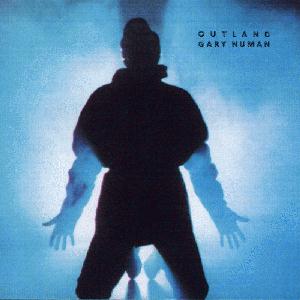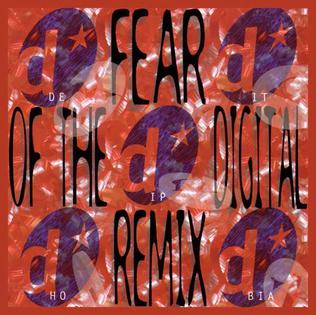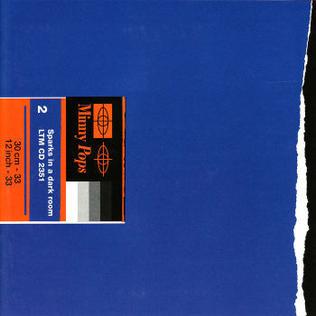
Digimortal is the fourth studio album by American industrial metal band Fear Factory, released on April 24, 2001 by Roadrunner Records. It is a concept album and the final part of a trilogy that started with Demanufacture and continued with Obsolete, which it is the sequel to. It was the band's last album before officially breaking up in March 2002. Although Digimortal was not a commercial success, this was not given as reason for the band's breakup, which was instead said to be frontman Burton C. Bell's desire to "form a band that's more indie-rock-oriented". Fear Factory would officially reform in 2003, however, to begin work on their next album, Archetype. Digimortal was the last to feature founding guitarist and songwriter Dino Cazares for eight years until his return to the band in 2009.

Lightbulb Sun is the sixth studio album by British progressive rock band Porcupine Tree, first released in May 2000, and later reissued in 2008 on CD, DVD-A surround sound, and vinyl.

Stereopathetic Soulmanure is the second studio album by American musician Beck. It was released on February 22, 1994, by Flipside. The album shows a strong folk influence, consisting of home recordings, studio recordings, live performances, field recordings, sound collages, and abstract noise experiments.

Lo-fi is a music or production quality in which elements usually regarded as imperfections of a recording or performance are audible, sometimes as a deliberate aesthetic choice. The standards of sound quality (fidelity) and music production have evolved throughout the decades, meaning that some older examples of lo-fi may not have been originally recognized as such. Lo-fi began to be recognized as a style of popular music in the 1990s, when it became alternately referred to as DIY music.

Do the Collapse is the 11th album by Dayton, Ohio indie rock group Guided by Voices. In contrast with their lo-fi reputation, the album features glossy production work from Ric Ocasek, which drew a mixed reception from critics and fans. "Hold On Hope" was covered by country singer Glen Campbell on his 61st album Ghost on the Canvas in 2011. In his introduction to James Greer's book Guided by Voices: A Brief History: Twenty-One Years of Hunting Accidents in the Forests of Rock and Roll, Academy Award-winning film maker Steven Soderbergh referenced the album stating "that album Ric Ocasek produced was terrific."
Deitiphobia is a Christian industrial, electro and techno band from the United States formed in 1990 consisting of the duo of Wally Shaw and Brent Stackhouse. Known originally as Donderfliegen, the band changed names to Deitiphobia in 1991 to better clarify the band's focus on Christianity. The band's name means "Fear of God".

The Key is the debut studio album from American progressive death metal band Nocturnus. It was released on Earache Records on 1st October 1990.

Bubble & Scrape is the fourth album by American indie rock band Sebadoh. It was released by Sub Pop in April 1993.

Mechanical Poet was a Russian metal band formed in Moscow, Russia, in 2002. The band released concept albums in post-prog and symphonic progressive metal genres with orchestral arrangements and heavy use of keyboards. Its music is strongly influenced by film score composers like Danny Elfman, and its lyrics are based on fantasy, gothic and science fiction stories. The band split in 2009. However, its members have since moved on to a number of other projects.

Miracle is an album by Willy DeVille. Recorded in 1987, it was the first album that Willy DeVille recorded under his own name. Prior to Miracle, DeVille recorded six albums with the band Mink DeVille, the last four of which were really solo albums by Willy DeVille in that no members of the original band played on the four albums.

Outland is the tenth solo studio album by English musician Gary Numan, released in 1991. It was Numan's second and last studio album to be released by I.R.S. Records. It reached Number 39 on the UK charts. The songs "Heart" and "My World Storm" were released as singles; "Heart" charted at Number 43, while "My World Storm" eventually became a US-only promo single after a planned UK release was shelved due to the inner turmoil at the label around the release of the album. The latter however reached Number 46 on the US dance chart.

Fear of the Digital Remix is the third studio album by industrial band Deitiphobia, released in January 1995 by Myx Records. All the songs on the album were created by Michael Knott using samples from two earlier Deitiphobia albums, Fear of God and Digital Priests - the Remixes, which he digitally edited to produce songs that barely resembled the originals they were taken from.

Clean is the second full-length studio album from industrial band Deitiphobia, released in 1994 by Myx Records. It is the earliest Deitiphobia album not to feature Brent Stackhouse, who left in 1992, and was also the band's debut for the Myx label. The album features Sheri Shaw, who remained with Deitiphobia until it dissolved in 2001, and Michael Knott, who produced Fear of the Digital Remix and was also the founder of the band's previous record label, Blonde Vinyl.

Fear of God is the first official studio album by industrial band Deitiphobia, who had been known as Donderfliegen up until that time. It was originally released in late 1991 by Blonde Vinyl. The album was later reissued in 1998 by Flaming Fish Music, alongside a reissue of Digital Priests - the Remixes. The reissue features three additional tracks, and two of the tracks from the original release are merged.

Digital Priests is a demo album by industrial band Deitiphobia, originally released under the name Donderfliegen in 1990 on Compact Cassette only by an independent label, Slava Music. It was subsequently re-released on CD in 2001 by Millennium Eight Records as Donderfliegen, this time under the name of Deitiphobia. It is one of only two albums released by Slava Music before it became a sub-label of Blonde Vinyl. The entire album was re-recorded and remixed in 1992, and released as Digital Priests - the Remixes.

Digital Priests – The Remixes is a remix album by industrial band Deitiphobia, originally released in 1992 on the Slava Music sub-label of Blonde Vinyl. The album features remixed versions of some of the songs from the band's original demo, Digital Priests, from which its name is derived. It also includes several new and previously unreleased songs. Digital Priests – The Remixes is sometimes described as Deitiphobia's unofficial second album. It was reissued in 1998 by Flaming Fish Music with three additional tracks, alongside the reissue of the band's debut album, Fear of God.

Lo Fi Acoustic Excursions is the first of two albums released by Mike Badger featuring a compilation of his various musical incarnations including the La's and The Onset, its sister album being Lo Fi Electric Excursions. Lo Fi Acoustic Excursions was released by the Generator Label in 2004. It contains a collection of songs, outtakes, ideas and sketches from 1983 to 2003.

The Spoils is a debut full-length studio album by Nika Roza Danilova, better known as Zola Jesus, released in July 2010 on Sacred Bones Records. To the LP version's original 10 tracks the CD adds five songs: two from "Soeur Sewer" and three from the "Poor Sons" 7-inch singles.

One Pattern is a 1986 album by P-Model and the last before the band's hiatus in 1988.

Sparks in a Dark Room is the second studio album by Dutch experimental electronic post-punk/ultra band Minny Pops. After signing to Factory Benelux in 1982 following their "noisy" and "goofy" debut album Different Measures, Drastic Movement (1979), the band settled into a new, less aggressive sound featuring influences of industrial music and funk. Recording Sparks in a Dark Room in late 1981, the band headed for a more clinical and clean sound. Considered a high point of the ultra movement, the record features cold, electronic tones and darkly humorous lyrics from lead singer and songwriter Wally van Middendorp.



















